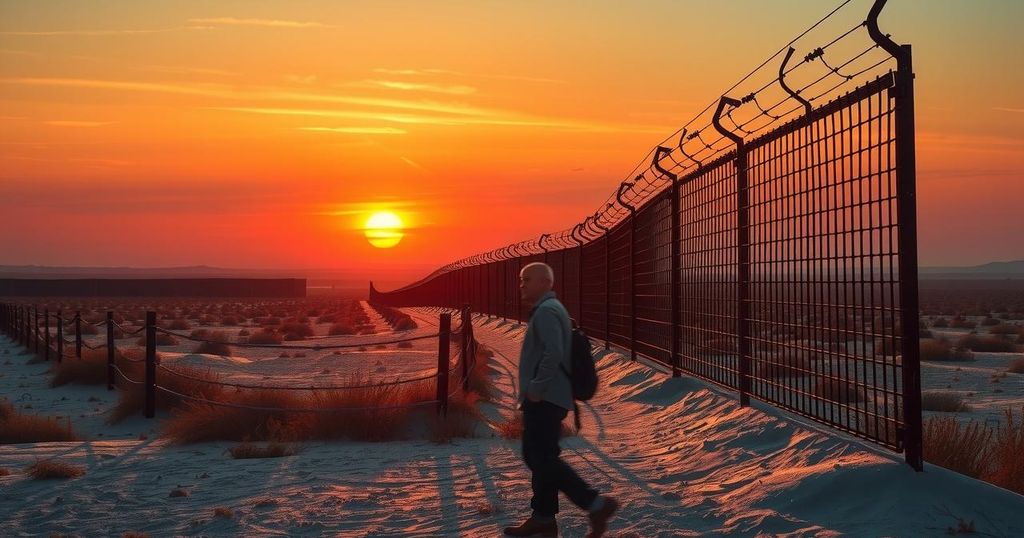Illegal Crossings at U.S.-Mexico Border Decline Amid Trump’s Immigration Policies

Illegal crossings at the U.S.-Mexico border have dropped significantly since President Trump’s return to office, with statistics indicating a decrease from over 130,000 to around 8,300 in one year. Trump’s executive actions, including enhanced deportation measures and newly established agreements with Mexico, are credited for this decline. However, there are growing concerns regarding the broader impact on legal migrants and ongoing legal challenges against his administration’s tactics.
Since his recent return to the presidency, U.S. President Donald Trump has implemented several executive actions aimed at reducing illegal immigration. In February of the previous year, over 130,000 individuals were encountered by border patrol while attempting to cross into the United States from Mexico. However, the latest data indicates that this figure dropped significantly to approximately 8,300 in February of this year, marking a nearly 94 percent decline, as reported by the U.S. Department of Defense.
Border Patrol Chief Mike Banks attributed these striking reductions in illegal crossings to President Trump’s commitment to securing U.S. borders, a primary promise from his campaign. Key actions taken by Trump include suspending the U.S. asylum system, enhancing deportation measures, and deploying additional military personnel along the southern border. Moreover, he achieved an agreement with Mexico to deploy soldiers to patrol the border area, aligning efforts to defer severe tariffs on Mexican imports.
The crackdown on illegal immigration launched by the Trump administration has conveyed a formidable message to potential border crossers: unauthorized entry will likely result in deportation. The campaign has heightened media coverage of deportations, with recent examples featuring over 250 alleged Venezuelan gang members being transported to El Salvador. Trump invoked the Alien Enemies Act, a law that endows the president with expansive authority to detain and deport citizens of enemy nations in wartime without standard legal protocols.
Trump has characterized the current situation as analogous to a state of war, asserting that those deported are predominantly violent criminals, including murderers and drug traffickers. In contrast, the American Civil Liberties Union has mounted legal challenges against these claimed wartime authorities, deeming the administration’s actions as unlawful. Legal expert Lee Gelernt cautioned, “We’re on very dangerous ground here,” emphasizing the potential for further misapplication of wartime powers.
Despite the legal challenges facing Trump’s immigration strategies, analysts suggest that they are producing results. Tony Payan from the Baker Institute observed, “At this point, I see it as a very effective strategy.” While he noted ongoing questions regarding the morality of these policies, Payan indicated that cooperation between Mexico and the U.S. has played a significant role in sealing the border, albeit some credit should go to previous policies enacted during President Biden’s administration.
Concerns are rising that the tough immigration measures may adversely affect individuals with lawful residency. Reports have surfaced regarding the detention of individuals legally entitled to reside in the U.S., including those engaged in protests, such as green card-holder Mahmoud Khalil. Furthermore, the State Department has indicated that visa holders are under continuous scrutiny for compliance with U.S. laws. Additionally, the Trump administration plans to terminate the temporary legal status of over half a million migrants from Cuba, Haiti, Nicaragua, and Venezuela, further intensifying concerns around immigration policies.
In summary, illegal crossings at the U.S.-Mexico border have seen a dramatic decline since President Trump’s return to office, attributed largely to his aggressive immigration policies. While these measures are causing significant disruptions to legal migrants, they are, at least temporarily, achieving the intended effects of reducing unauthorized entries into the United States. The long-term implications of these actions continue to unfold, particularly given the legal challenges and ethical concerns raised by advocates of immigrant rights.
Original Source: www.channelnewsasia.com








